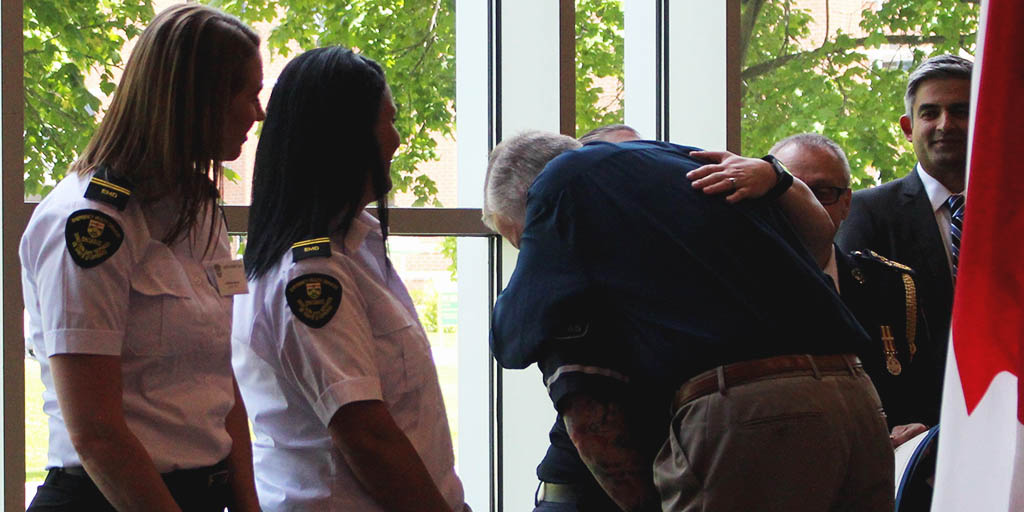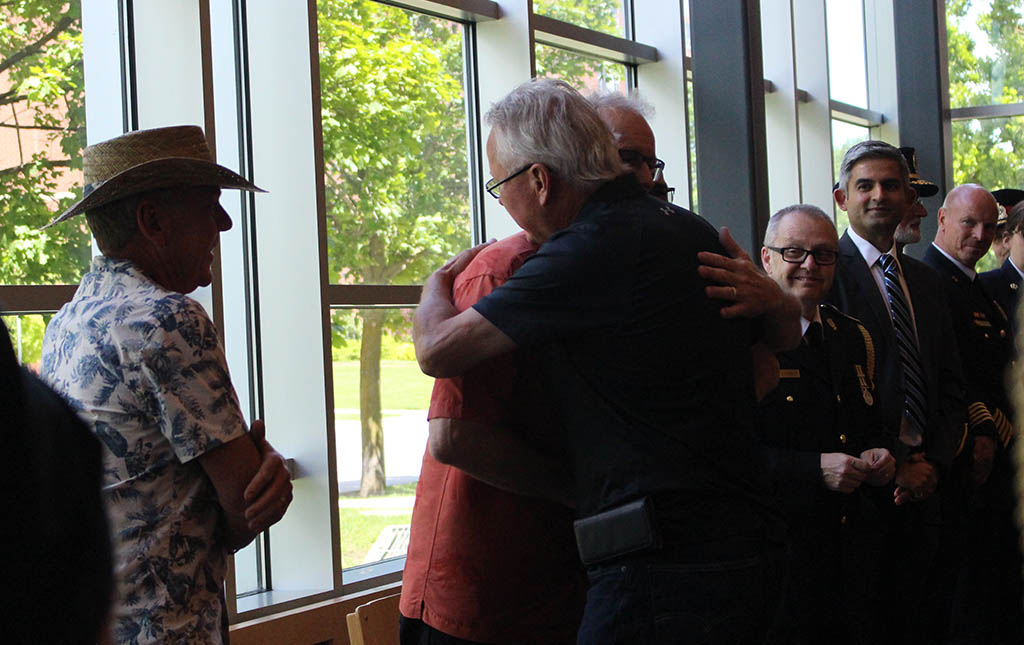Fanshawe helps Middlesex-London EMS hold cardiac arrest survivor day
 CREDIT: SAMANTHA KACZALA
CREDIT: SAMANTHA KACZALASurvivor, Randy Bolton (blue shirt) embraces one of the paramedics who saved his life.
Middlesex-London Emergency Medical Services (EMS) held their 5th Annual Cardiac Arrest Survivor Day event at Fanshawe Student Union’s (FSU) Oasis on June 2.
Jay Loosley, superintendent of education of Middlesex-London EMS, explained the event is held each year to celebrate the survivors of out-of-hospital cardiac arrest as well as to commemorate the first responders who helped save them.
“It’s important for the patients to kind of close the loop and meet all the people that saved them, the paramedics, the people they talked to on the phone – the dispatchers – the bystanders that did CPR, the firemen, the policemen that all helped them,” Loosley said.
Loosley also stated that Survivor Day also closes the loop for the paramedics themselves.
“It’s great for them [paramedics] because the last time they saw the patient they were near dead, so it’s really nice to see them, to see their patient up talking, walking, and closing that loop of ‘wow I saw you in this state and now I see you doing well because of the things that I did.’ It’s very rewarding for the paramedics,” Loosley said.
 Survivor, Jarmo Stromberg (black shirt) embraces one of his friends who saved him. CREDIT: SAMANTHA KACZALA
Survivor, Jarmo Stromberg (black shirt) embraces one of his friends who saved him. CREDIT: SAMANTHA KACZALAAccording to a Middlesex-London EMS press release, about 40,000 cardiac arrests happen each year in Canada. It is estimated that only five per cent of those with a sudden cardiac arrest, outside of the hospital, survive.
Statistics by the Middlesex-London EMS stated that since 2006 the number of survivors of cardiac arrest patients outside of the hospital in the Middlesex-London area has increased:
- 2006: 263 cardiac arrests, 14 survived
- 2014: 263 cardiac arrests, 27 survived
- 2016: 291 cardiac arrests, 40 survived
One of the survivors, Randy Bolton, said, “I wouldn’t have missed this [the Survivor Day event] for the world.”
Bolton had a cardiac arrest on Nov. 23, 2016 after getting out of the shower. Trapped inside the bathroom, his wife, Gay Bolton, called 911, where firefighters and paramedics quickly and persistently worked on rescuing Bolton from the bathroom. Finding no heartbeat, Bolton had to be defibrillated six times before he was rushed to the hospital with a weak pulse.
In the intensive care unit (ICU) for nine days on life support, six days in critical care and four days in cardiac care, Bolton was finally released from the hospital to return home to his family.
“I am grateful for a second chance,” Bolton said. “Probably wouldn’t have had it if it wasn’t for the quick response of the emergency people.”
With his second chance, Bolton has big plans for the future, including, going on a Panama Canal cruise with Gay and taking the grandchildren to Disneyland.
 The survivors of cardiac arrest and their friends and family stand in applause for all the people who saved their lives. CREDIT: SAMANTHA KACZALA
The survivors of cardiac arrest and their friends and family stand in applause for all the people who saved their lives. CREDIT: SAMANTHA KACZALALoosley emphasized the importance of more bystanders needing to know cardiopulmonary resuscitation (CPR) and how to use automated external defibrillators (AEDs) for the survival of future cardiac arrest victims.
“Some of the saves we have are because of bystander CPR. It’s so important that bystanders learn CPR and learn how to use an AED, and we see that today with our rescuers and our survivors who are here today because of bystander CPR and AEDs.”
Loosley encouraged anyone who is interested in taking lessons on CPR and how to use AEDs to visit the Middlesex-London EMS website at mlems.ca.














